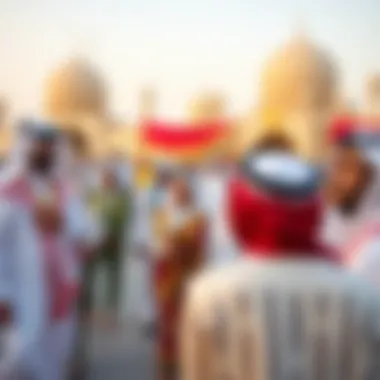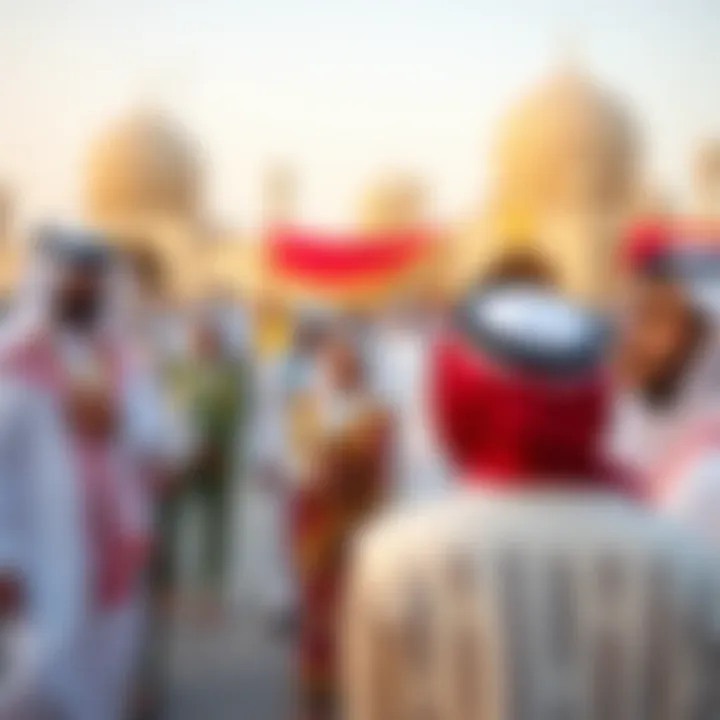UAE National Holidays 2023: Importance and Celebration


Intro
When it comes to the United Arab Emirates, holidays hold a profound significance that goes beyond mere days off work. They are moments when people come together to celebrate their history, culture, and shared values. In 2023, the observed national holidays not only reflect the UAE's rich heritage but also illustrate the blending of tradition with the fast-paced innovation that characterizes the nation.
The UAE's national holidays are an opportunity for people—both locals and expats—to immerse themselves in the cultural vibrancy of this nation. From marking the end of Ramadan to celebrating the country's unification, these holidays set a rhythm to life in the emirates, both in the bustling metropolises like Dubai and in the quieter, picturesque locales.
As we dive into this comprehensive guide of the UAE National Holidays in 2023, it’s crucial to understand the context in which these celebrations are observed. Each holiday comes packed with unique customs, communal gatherings, and even specific regulations that affect various sectors, including hospitality, travel, and retail. By recognizing these dynamics, readers can better plan their experiences, whether they are investing in real estate or simply visiting for leisure.
In this article, we will explore the significance of each national holiday, the observance practices that prevail among the emirates, and how these traditions differ yet reflect a common spirit. We will also touch upon implications for the public and private sectors, providing insights that might be vital for investors, homebuyers, and even tourists looking to engage with the richness of UAE's festivities.
It's time to take a closer look at what each holiday means, how they shape societal norms, and the unifying thread that runs through these celebrations. From bustling celebrations in urban centers to intimate family gatherings in local homes, the UAE’s holidays are a testament to a nation in harmonious progression into the future while cherishing its past.
Preface to UAE National Holidays
The concept of national holidays in the United Arab Emirates is not merely a calendar mark but embodies the rich cultural fabric and social significance of the nation. These holidays create space for reflection, enable expressions of communal identity and often provide a platform for the manifestation of values that resonate with the populace.
By diving into this matter, one can appreciate how national holidays serve as a crucial intersection of tradition and modernity in the UAE. In a country blending ancient customs with rapid development, holidays allow citizens and tourists alike an opportunity to connect with the heritage that is at the heart of Emirati culture.
Understanding the Concept of National Holidays
National holidays are designated days where the nation pauses its routine to commemorate significant historical events or religious occasions. For the UAE, these days hold importance both as reminders of the past and as opportunities for collective celebration. Each holiday is steeped in meanings that reflect the values and beliefs of the people. For instance, a holiday like Eid al-Fitr celebrates the end of Ramadan and embodies principles of charity, gratitude, and community.
Holidays are often heralded by various festivities, parades, and gatherings, which encourages a sense of unity among diverse populations living in this melting pot. Observations of these holidays usually have a specific character in each emirate, showcasing local traditions and bringing communities together in a celebratory atmosphere.
The Role of Holidays in UAE Culture
In the UAE, holidays are not just days off from work; they play a pivotal role in shaping social interactions and reinforcing community bonds. Families often gather during these periods, creating a shared experience that strengthens family ties and extends networks of friendships. Moreover, many Emiratis use these opportunities to share their cultural practices and values with expatriates and visitors, enriching everyone's understanding of the local way of life.
The celebrations can also be a showcase of art and performance, where traditional music, dance, and cuisine come to the fore. For instance, during national holidays, you might find traditional dances like Al Ayallah performed, drawing in captivated crowds with their rhythmic displays and cultural storytelling.
In essence, UAE national holidays serve as both a reminder and a celebration of the nation’s core values, encouraging both introspection within society and a broader connection with the world. They illustrate how an understanding of national identity and collective experience shapes not just a holiday but any day in the UAE.
Overview of UAE National Holidays
The overview of UAE National Holidays in 2023 serves as a foundational framework to understand the cultural and economic significance of these observances within the Emirates. National holidays in the UAE epitomize the coexistence of tradition and modernity that defines its society. They are not just days off work; they are pivotal moments when families gather, communities connect, and the rich heritage of the nation is showcased. In an increasingly globalized world, understanding these holidays becomes paramount for those engaged in business, tourism, and local culture.
Holidays such as Eid al-Fitr and UAE National Day provide unique insights into the values held by Emiratis, while allowing opportunities for foreign investors and visitors to immerse themselves in authentic experiences. Each holiday comes with its own customs and practices, rendering them memorable for those who observe them, whether locals or tourists.
List of Key Holidays Celebrated
The UAE plays host to an array of public holidays, each steeped in cultural importance. Below is a list of key dates that are significant in 2023:
- Eid al-Fitr: Marks the end of Ramadan, characterized by festive prayers and family gatherings.
- Eid al-Adha: Known as the "Festival of Sacrifice," commemorating willingness of Ibrahim to sacrifice his son.
- Hijri New Year: Marks the start of the Islamic calendar.
- Prophet Muhammad’s Birthday: Celebrates the birth of the last prophet in Islam.
- UAE National Day: Celebrated on December 2, it marks the unification of the Emirates.
- Commemoration Day: Honors those who have sacrificed their lives for the UAE.
Each of these holidays has a unique set of rituals and events associated with them, shaping not only the cultural landscape of the nation but also influencing various sectors like tourism and retail.
Significant Dates and Events
In 2023, several of these national holidays will coincide with pivotal moments in the UAE's calendar. Here are some significant dates to note:
- February 23: Hijri New Year, which emphasizes reflection and renewal within the Islamic community.
- April 21-23: Eid al-Fitr, anticipated by many for its festive spirit and the breaking of the fast.
- June 26-29: Eid al-Adha, which includes the joyous act of sacrifice and charity.
- December 1: Commemoration Day, where ceremonies and moments of silence lay tribute to the nation’s heroes preceding the UAE National Day celebrations.


"Holidays in the UAE are not just days circled on a calendar; they're moments of cultural reflection, transformation, and celebration."
Understanding these dates and the events surrounding them offers perspective on the social fabric of the UAE. From the perspectives of investors and property managers, knowing holiday schedules can impact everything from market trends to potential disruptions in business operations, making this knowledge not just cultural but strategically significant.
For those curious to see how these celebrations unfold in real-time, they can refer to local resources and social media platforms to catch glimpses of grand events and cultural activities, fostering deeper connections with the UAE's vibrant environment.
Public Holidays in the UAE
In the United Arab Emirates, public holidays serve not only as days off from work but also as pivotal moments of reflection and celebration. They act as a bridge connecting tradition with modernity, enhancing both local and tourist experiences, while also impacting economic dynamics and societal interactions. Understanding these holidays allows investors and business managers to appreciate the local culture more deeply, which can make a significant difference in forging strong business relationships.
The observances during these periods also reflect the rich tapestry of the UAE’s heritage, blending Islamic traditions with more contemporary influences that have permeated society as it has evolved over the years. Knowing the timing and significance of these holidays can help in planning investment activities and understanding the market behavior during these times.
Great Day of Arafah
The Great Day of Arafah is not just another date on the calendar; it holds immense spiritual significance for Muslims around the world. This day falls on the second day of Hajj, when millions gather at the plain of Arafat to pray and seek forgiveness. In the UAE, this day is observed as a public holiday, allowing for a collective pause in daily activities.
On Arafah, the atmosphere is one of introspection and gratitude. Many Emiratis and residents dedicate time to reflect on their own lives and the blessings they have. The spirit of giving is also heightened, as families often engage in charitable acts during this period. Businesses too may have reduced operations, allowing their staff to observe the day’s significance.
"Once we reach Arafah, we are on our way to something much greater—referring to both Hajj and the collective experience of unity among Muslims worldwide."
Eid al-Adha Observance
Eid al-Adha, or the Festival of Sacrifice, follows the Great Day of Arafah and marks the culmination of the Hajj pilgrimage. In 2023, this holiday is slated to be significant not just for religious reasons but for its cultural implications within the UAE. Celebrations involve the sacrifice of an animal, commemorating Abraham's willingness to sacrifice his son in obedience to God. The distribution of meat to the less fortunate showcases the community spirit of generosity that punctuates this holiday.
Families come together to share meals, visit mosques, and engage in community events. Moreover, the holiday serves as a time for businesses to launch promotions or sales, capitalizing on the festivity. For potential investors or businesses looking to tap into the Emirati market, understanding Eid al-Adha and its observance becomes crucial.
UAE National Day
UAE National Day is an occasion like no other, bringing together citizens and residents to celebrate the unification of the seven emirates. Each year on December 2nd, the nation commemorates not just its formation, but the diverse journeys that have led to the UAE’s current identity. Events such as parades, fireworks, and cultural exhibits highlight the rich heritage while embracing a vision for the future.
For business leaders and property managers, this holiday can be significant. Many people travel within and outside the country, impacting consumer behavior and the hospitality sector. Understanding the nuances of this day can help businesses market their services effectively. National Day serves as a reminder of the progress achieved and the aspirations for future development—a foundational message for businesses aiming for long-term engagements in the UAE.
Through recognizing the significance of these public holidays, one gains insights into the cultural fabric of the UAE, which can greatly influence both social dynamics and business strategies.
Cultural Significance of Holidays
Holidays in the UAE are not merely breaks from the daily grind; they are vital threads woven into the fabric of the nation’s identity and culture. Understanding the cultural significance of holidays offers insights into the collective values, traditions, and social cohesiveness that characterize Emirati life. As the nation stands at the crossroads between heritage and modernity, these observances reflect a rich tapestry of history and spirituality that connects citizens and residents alike.
The importance of these holidays is twofold: they honor the religious heritage and foster community bonds. Islamic holidays, such as Eid al-Fitr and Eid al-Adha, for instance, are steeped in religious significance, celebrated as moments of reflection, gratitude, and joy. During Eid, families often gather to share feasts, engage in prayers, and extend charitable acts to the less fortunate, reinforcing the values of compassion and unity. Additionally, the country's distinct holidays, like UAE National Day, celebrate the establishment of the federation and evoke a sense of national pride among the diverse population.
Moreover, communities engage in activities that promote togetherness and inclusivity. These observances provide a backdrop for various traditions, such as folk dances, cultural exhibitions, and fireworks, which are not only entertaining but also educational. They serve to pass on stories from generation to generation, preserving the heritage while embracing the influences of contemporary life. The striking events of public holidays mirror the vision of the leaders who aim to cultivate a nation that respects its roots yet is progressive in outlook.
"Understanding the cultural significance of holidays in the UAE enriches the experience of all who celebrate them, revealing deeper layers of connection and interaction among residents."
When discussing the benefits of holidays, it’s clear that they foster tourism, encouraging visitors to explore the rich cultural landscape of the UAE. Tourists can partake in traditions that might be foreign yet fascinating, aiding in cross-cultural dialogue and a better understanding of Emirati customs. Furthermore, holidays enhance local economies, as businesses often prepare special offerings, which can lead to increased sales and community engagement.
In essence, the cultural significance of holidays in the UAE goes beyond festivities. They encapsulate a narrative that binds diverse individuals together, rooted in shared values and enriched by collective experiences. As such, exploring these holidays provides a lens through which both locals and visitors can appreciate the spirit and resilience of the UAE.
Religious Undertones in National Holidays
Every nation has its set of holidays that resonate with its populace - that’s no different for the UAE, where religious undertones are paramount. Islamic tenets deeply inform the observance of national holidays. For example, Eid al-Fitr and Eid al-Adha are not just events on the calendar; they are profound expressions of faith. Participants reflect on their spiritual journeys, engage in prayer, and encapsulate the essence of giving.


By prioritizing these religious observances, the UAE embodies values such as compassion, charity, and family bonding. Each holiday is an opportunity to renew faith and forge connections both with one’s community and with personal beliefs, offering a range of experiences that are both spiritually enriching and socially significant.
Community Engagement and Celebration
Holidays serve as an invitation to engage with one another in meaningful ways. Community engagement during these times fosters relationships, breaks down barriers, and cultivates a spirit of togetherness. Activities such as community fairs, public performances, and collective prayers paint the streets with vibrancy, echoing the spirit of celebration. Neighbors come together, sharing food, laughter, and memories that resonate long after the holidays have passed.
The community aspect of holiday celebrations encourages participation from all segments of society, underscoring the UAE’s commitment to inclusivity. It cultivates a respectful understanding of different cultural backgrounds as expatriates and locals alike join in the festivities. Recognizing holidays as a collective experience reinforces the notion that the UAE, while progressive, still holds tightly to its roots, demonstrating how unity can be fostered in diversity.
Impact on Business and Economy
The national holidays in the UAE carry substantial weight not just in cultural terms but also in economic ramifications. These observances can shape the dynamics of various industries, leading to a mix of opportunities and challenges. For investors and businesses, understanding this impact is crucial. Essentially, these holidays can drive economic activity through events, tourism, and spending, or create slowdowns due to business closures.
Business Shutdowns during Holidays
During national holidays, many businesses in the UAE often experience shutdowns, leading to changes in commerce and productivity. Government offices, schools, and many private enterprises usually close, giving citizens and residents alike time for rest, reflection, and familial bonding. This halt, however, creates significant challenges for businesses that rely heavily on regular operations.
- Loss of Revenue: In the days leading up to and during holidays, many businesses brace for an impact on their bottom line. Restaurants, retail stores, and service providers might notice a drastic dip in sales as consumers shift their focus to celebrations.
- Adjustment Period: Companies often need to plan their operating schedules ahead of holidays to manage inventory and staffing efficiently. An unexpected surge in demand right before holidays can catch some businesses off guard, resulting in stock shortages.
- Workforce Management: In sectors where continuous operations are vital, such as hospitality and healthcare, managing shifts during these periods becomes a challenge. Employers may need to offer additional incentives to staff willing to work on holidays, leading to increased labor costs.
Tourism Boost during Holiday Seasons
Conversely, national holidays tend to be a boon for tourism, making them an invaluable asset for the UAE’s economy. Tourists flock to the country to experience the rich cultural celebrations, generating significant revenue for various sectors.
- Increase in Visitor Numbers: During major holidays like Eid al-Fitr and the UAE National Day, the influx of international visitors rises sharply. Tourists often seek to experience local traditions firsthand, driving demand for hotels, restaurants, and entertainment venues.
- Special Events: Many businesses curate specific events or offers to coincide with holidays, such as concerts, fireworks shows, and cultural exhibitions. These can draw in crowds and bolster local economies, making the holidays an integral part of the tourism strategy.
- Long-term Investments: Investors take note of the increased traffic and potential for growth during these holiday seasons. Businesses looking to capitalize on this surge often consider long-term investments in infrastructure, aiming to enhance the overall experience for visitors.
“Holidays are not just days off; they are economic opportunities that can reshape communities.”
In wrapping up this section, it’s clear that national holidays in the UAE represent a complex interplay of challenges and advantages. Understanding this impact is vital for stakeholders looking to navigate the economic landscape effectively. The balance between festival cheer and business practicality can determine how successfully entities adjust their operations to meet both the demands of celebration and profit.
Private Sector Holidays
The private sector in the UAE often reflects the nation’s dynamic economy, and its approach to holidays illustrates a blend of tradition and modern business practices. Understanding the holidays observed in this sector helps investors and property managers navigate the local market better. Just like the waves of the sea, the observance of holidays can ebb and flow, impacting not just operations but also the cultural fabric of the workplace.
Variances in Observance
While public holidays are fixed across the UAE, private sector holidays may vary substantially from one company to another. Some businesses, especially multinational corporations, may align their holiday schedules with those of their parent countries. For example, an American firm might observe Thanksgiving alongside national holidays such as Eid al-Fitr and UAE National Day. This can lead to a patchwork of observances that can be confusing for employees who work across different sectors or for expatriates navigating their work-life balance.
Moreover, the flexible nature of the private sector allows companies to incentivize productivity by granting additional holidays, or at times, lesser days off to meet project deadlines. Such choices often reflect the industry and company's ethos. For instance:
- Tech companies with tight deadlines might offer time off only during major holidays.
- Startups may be more lenient with holiday allowances as they build their team culture.
This variance means that employees can find themselves in vastly different environments depending on where they work, which can lead to mixed experiences during the holy times of the year.
Employee Rights and Holiday Observance
In the UAE, labor laws govern holiday observance in the private sector, ensuring that employees receive certain rights. According to the Ministry of Human Resources and Emiratisation, everyone is entitled to paid public holidays, but private companies have some leeway in their observance. This can create a bit of a gray area for workers, particularly expatriates who might not fully grasp their rights.
For instance, regardless of how a company chooses to observe holidays, it must comply with the minimum legal requirements set by labor laws. Employees are entitled to:
- Leave during official public holidays, which includes major religious events and national celebrations.
- Compensation if required to work on these days, typically at a rate not less than the basic pay, often observed at one-and-a-half times the standard pay.
This legal framework aims to protect workers while granting companies some flexibility to manage their operations. However, being informed is crucial for employees. They should engage in open conversations with their HR departments to understand specifics.


"Knowledge of one's rights is the backbone of a confident workplace experience."
Travel Considerations during Holidays
Traveling during national holidays in the UAE can be a mixed bag. While the celebrations create a vibrant atmosphere, they also bring about challenges that travelers should be aware of. Understanding these factors not only elevates the travel experience but can also save time and money, making for a smoother journey.
Traffic Patterns and Crowds
With masses of people flocking to various attractions and family gatherings, traffic tends to become a real headache during holidays. Major highways and city roads are usually bustling, especially in metropolitan areas like Dubai and Abu Dhabi. Certain times of the day are particularly congested, mainly when families are heading out for celebrations or returning home after festivities.
It's advisable to plan ahead: leaving earlier in the morning or later in the evening can help dodge the thick traffic. Relying on public transport, such as the Metro in Dubai, can also ease the burden, allowing one to enjoy the sights without the stress of parking.
Moreover, popular spots like the Burj Khalifa or the Louvre Abu Dhabi can become overly crowded. Being aware of peak visiting times can save you from standing in long queues. Consider visiting lesser-known attractions to enjoy a more relaxed environment while still absorbing the rich culture and history.
"Timing is everything, especially during holidays. A little foresight can turn a potential hassle into a delightful day out."
Accommodation and Bookings
Booking accommodation during national holidays presents its own set of challenges. Hotels and resorts experience a surge in bookings, often leading to fully booked conditions days or weeks in advance. To secure a stay that matches your preferences, it’s crucial to plan ahead.
Consider setting alerts on hotel booking platforms or contacting hotels directly for reservations well before your travel dates. If you're flexible with your choice of location, you might find suitable options in neighboring areas instead of main tourist hotspots.
Additionally, holiday packages that include both accommodation and activities can be a real steal. Many hotels offer special deals during holidays, adding amenities like breakfast and spa packages to sweeten the pot.
In some cases, it's worth checking for alternative lodging options such as serviced apartments or vacation rentals. They often provide a homely feel, ideal for families or groups who wish to celebrate together.
In summary, while the holidays in the UAE offer a feast for the senses, being mindful of the travel dynamics makes it a lot more enjoyable. Planning for traffic and securing accommodations ahead of time transforms the holidays into a joyful experience, allowing for fuller participation in cultural celebrations.
Future of National Holidays in UAE
In the ever-shifting landscape of the United Arab Emirates, national holidays serve as a cornerstone for cultural identity and internal unity. Their evolution attempts to balance the age-old traditions with the burgeoning demands of modern society. As we peer into the future of national holidays, we must consider factors such as the influence of globalization, the preferences of a diverse populace, and the commitment to maintain cultural roots. With the UAE striving to enhance its global image, understanding how these holidays will adapt is not just alluring but essential for investors and property managers looking to engage meaningfully with the country’s cultural fabric.
Evolving Traditions
Traditions in the UAE aren’t set in stone; they're as fluid as the golden sands of the desert. With each passing year, the observance of national holidays reflects changing societal norms and values. While some customs remain pillars of celebration, new practices are born out of the blend between the nation's rich heritage and the fleeting trends of modern living.
Take, for instance, the emergence of social media hashtags during major holidays like Eid. This digital twist allows an influx of younger generations to engage in traditions in innovative ways. The focus has shifted from solely familial gatherings to a broader discourse involving virtual platforms. As celebrations diversify, so too do the activities. From community service opportunities that promote social responsibility to virtual fireworks shows, holidays in the UAE are on a path of continuous transformation.
Considerations:
- Inclusion: Encouraging multicultural participation in holiday events will elevate the holiday’s significance.
- Technology's Role: Integrating technology into holiday observances, from mobile applications providing insights to virtual reality experiences showcasing traditional celebrations.
- Sustainability: There’s a growing push for sustainability during celebrations, with an emphasis on reducing waste and promoting eco-friendly activities, such as clean-up drives post-festival.
With these evolving traditions, stakeholders stand to benefit from new engagement opportunities in the tourism sector, drawing visitors with fresh experiences during national holidays.
Reflections on National Identity
National holidays aren’t just about rituals and festivities; they embody the essence of what it means to be part of the UAE. As various factions of society express their identities—whether through family gatherings, cultural performances, or national pride—the holidays become reflections of these multi-faceted identities.
Here, the impact of national holidays extends beyond personal celebration. They play a crucial role in reinforcing a collective narrative that binds the Emirati people. For business leaders and investors, recognizing this connection can greatly influence how they approach community engagement. Holidays serve as ideal opportunities for brands to resonate with local sentiments, showcasing their support for the culture and values of the nation.
Key Points:
- Civic Pride: The fostering of civic pride through community-led initiatives during national holidays.
- Cultural Preservation: Upholding traditions ensures that future generations remain connected to their roots.
- Economic Opportunities: Holidays provide businesses an avenue to showcase their commitment to the local community, enhancing brand loyalty.
As we look ahead, it becomes clear that the future of national holidays in the UAE will be shaped by a blend of tradition and modernity. These observances not only celebrate the past but also carve a path into the future, reflecting the evolving identity of a nation keen on showcasing its unique blend of heritage and progress.
Thus, the future of national holidays in the UAE is a tapestry woven from the threads of history, cultural pride, and the ever-changing fabric of society.
For more insights into the cultural significance of holidays in the UAE, you may visit Britannica.















